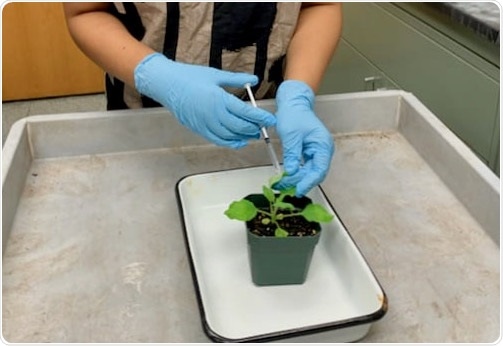Plant geneticists can utilize a range of synthetic biology tools made by a group at Louisiana State University (LSU) to drive gene expression. Researchers will be able to test their concepts before putting them into long-term tests, saving time and money as a result of their effort.

Image Credit: Realizing Increased Photosynthetic Efficiency (RIPE)
Debarati Basu, a postdoctoral researcher at LSU, who headed this work for a research project called the Realizing Increased Photosynthetic Efficiency (RIPE) says, “Our work could be a proof of concept before you get to the point of stable transgenic lines. Transgenic line experiments are long term and may take six months or more. You don’t want to get to that point and find out that it didn’t work because you were using the wrong gene promoter.”
RIPE, which is headed by the University of Illinois, is programming crops to be more productive by enhancing photosynthesis, the natural mechanism that all plants utilize to turn sunlight into energy and yields. The Bill & Melinda Gates Foundation, the Foundation for Food & Agriculture Research, and the UK Foreign, Commonwealth & Development Office jointly support RIPE.
Basu and her advisor Paul South used pieces of DNA that are already used in photorespiration gene expression to create synthetic fragments with mixtures of those pieces to drive the expression of transgenic DNA parts that could alter photorespiration. The study was recently published in the journal Frontiers in Plant Science.
The paper is all about giving scientists doing transgenic research a toolkit because we often use the same promoters to express a bunch of genes. If you work with the wrong plants you may get gene silencing, or you may need multiple generations, so the best idea would be to test the promoters you are using in a transient assay to see how they work.”
Debarati Basu, Postdoctoral Researcher, Louisiana State University
Basu has also explored creating synthetic promoters utilizing DNA fragments from native promoters, in addition to trying to build fresh DNA pieces which can be used for producing many genes simultaneously in plants. To prevent the unwanted consequences with powerful promoters, including transgene silence, the South Lab created synthetic promoters using native DNA fragments from the promoters of essential photorespiratory genes.
They studied the impacts of a reporter gene under such synthetic promoters in reaction to ideal and stress circumstances, such as rising temperature, strong light intensity, and low carbon dioxide.
These results not only add to the growing list of DNA pieces needed to make transgenic plants, but also provide information on how photorespiratory genes are regulated in both ideal and stressful settings.
We’re making these DNA parts to be in our toolbox and also stress testing them. People have made DNA parts to go into synthetic designs before, but now we’re testing them in different stress conditions.”
Paul South, Assistant Professor, Plant Physiology, Louisiana State University
South explained that stress testing DNA components for synthetic biology is just as important as stress testing car parts. Nuts and bolts in automobiles are stress-tested for vibration, temperature fluctuations, pressure, and breakage to ensure that they will work optimally when needed. Plants and the synthetic DNA pieces that are involved must also be checked for temperature to imitate field settings.
Basu and South expect to be able to share the DNA components as a toolkit for other scientists to use, as they have been stress tested now.
Source:
Journal reference:
Basu, D & South, P. F. (2022) Design and Analysis of Native Photorespiration Gene Motifs of Promoter Untranslated Region Combinations Under Short Term Abiotic Stress Conditions. Frontiers in Plant Science. doi.org/10.3389/fpls.2022.828729.